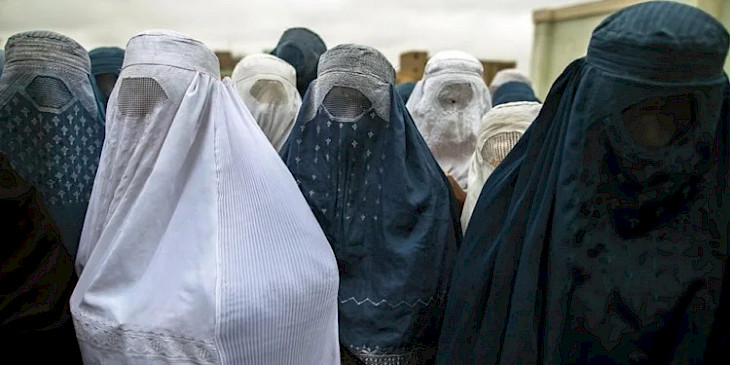The ruling Taliban movement in Afghanistan has approved a law prohibiting women from going out in public without wearing a hijab and from speaking loudly in public places.
The document was approved by Afghanistan's Islamic leadership and has come into legal force, reports Fergana.ru, citing ToloNews.
This set of rules was developed by Afghanistan's Ministry for the Propagation of Virtue and the Prevention of Vice, and this is reflected in the name of the document—the Declaration of Laws on Vices and Virtues. This unique code of conduct consists of 114 pages, divided into 35 articles, covering various aspects of life in the country: the appearance of men and women, music, public transportation, and holidays.
Article 13 is dedicated to Afghan women, stipulating that it is a woman’s duty to completely cover her face and body in the presence of men. Women are also prohibited from wearing thin, tight, or short clothing. According to Taliban officials, the mandatory wearing of the hijab is necessary to avoid the "fear of tempting others."
For the same reason, women are legally forbidden from speaking loudly in public, singing, chanting, or reciting. The law states that a woman's voice is intimate and seductive, and therefore should not be heard by strangers.
In addition, it is specified that drivers are not allowed to transport an adult woman without a male guardian. "We have always been as they [the Taliban] wanted, but their restrictions are increasing every day. We hope they will reconsider their decision," ToloNews quoted women's rights activist Tasfir Siyahposh.
The document also regulates the appearance of men, as stated in Article 22. For example, Afghan men are not allowed to wear ties, shave, trim their beards shorter than a fist-length, have haircuts that contradict Sharia law, resemble infidels (any people who are not Muslims), or befriend or assist such people.
Article 17 addresses the media, stating that their content should not contradict Sharia law and Islamic norms. Therefore, the media cannot humiliate or insult Muslims or display images of living beings.
"We assure you that this Islamic law will greatly help in promoting virtue and eradicating vice," concluded Maulvi Abdul Ghaffar Farooq, a representative of the department that developed the document.
Almost immediately after coming to power in 2021, the Taliban began introducing rules of conduct in line with religious norms. For example, strict restrictions on women were introduced. Essentially, the same rule of mandatory hijab-wearing in public has been in effect for over two years, but now it has been codified into law.
CentralasianLIGHT.org
August 26, 2024

